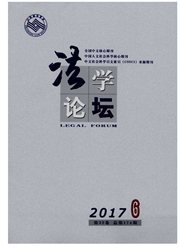

 中文摘要:
中文摘要:
在形式解释与实质解释的论争中,实质解释在中国特色罪刑法定原则下的出罪功能往往不被重视。实质解释是对犯罪成立所有条件的解释,它更注重严格控制解释的尺度,要求行为必须达到值得刑罚处罚的法益侵害性才能被认定为该当于客观违法构成要件,必须达到值得刑罚处罚的非难可能性才能被认定为该当于主观有责构成要件。对于挪用公款罪的认定,在客观上应当实质地解释“国家工作人员”,反对形式解释之身份论,应实质地解释“公款”并论证其公共属性;在主观上,应当实质地理解犯罪故意,独立地考察行为人对“国家工作人员”、“公款”等规范的构成要件要素的明知,查证其违法性认识。根据实质解释的立场和方法,能够否认教职工挪用尚未交付学校的“点招费”行为的客观违法性并阻却主观有责性,显示实质解释的出罪功能。
 英文摘要:
英文摘要:
Under the controversy between formal interpretation and substantive interpretation, the noncrime function of substantive interpretation is ignored. The substantive interpretation is interpretation for all the conditions of the crime establishment, which put more attention to controlling the interpretation dimension. It stresses that the objective behavior must arise serious consequences deserved the criminal penalty and that the subjective dolus must have its serious censure deserved the criminal penalty substantially. For the crime of misappropriating public fund, it is important to interpret the word "state functionary", to oppose identity theory which belongs to formal interpretation, and to comprehend the public nature of "public fund". In the subjective aspects, it is necessary to understand the guilty intent and to demonstrating the actor's full awareness to "state functionary" and " public fund", which is vital to one's cognition of his behavior illegality. From the perspective of substantive interpretation, the staffs in a university is not guilty absolutely to use Selective Admissions fund which does not reach the university's foundation. So this expresses the noncrime function of substantive interpretation significantly.
 同期刊论文项目
同期刊论文项目
 同项目期刊论文
同项目期刊论文
 期刊信息
期刊信息
